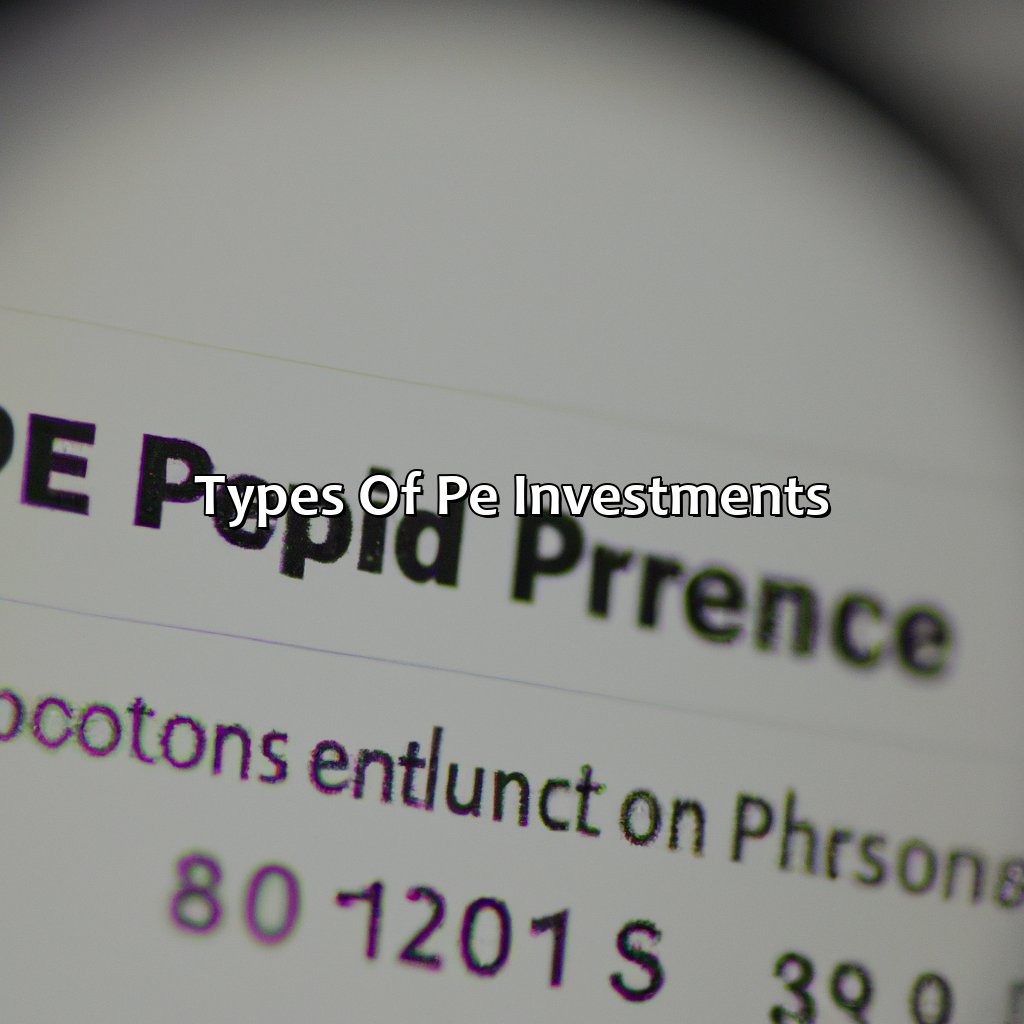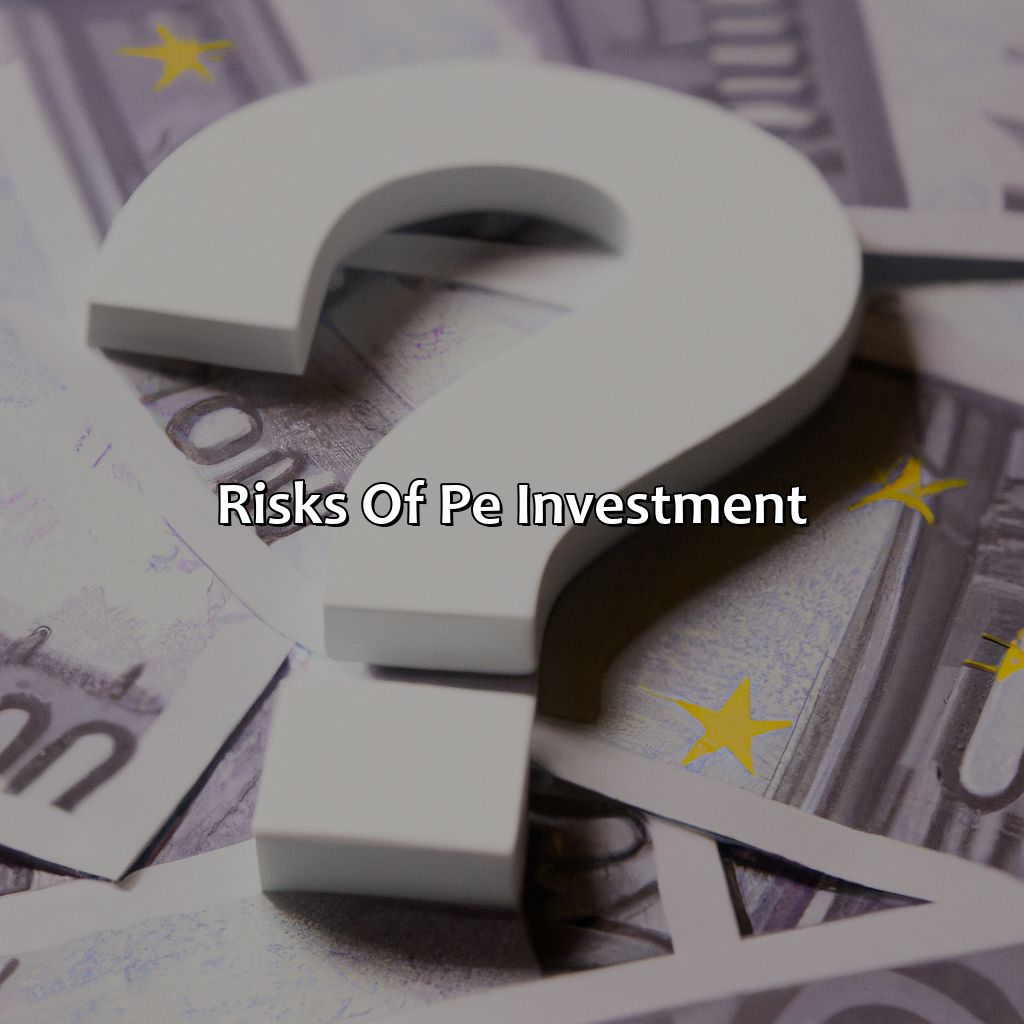What Is Pe Investment?
Key Takeaway:
- PE investment involves investing in private companies with the goal of achieving high returns. This is typically done through growth capital, leveraged buyouts, or distressed investments.
- One of the benefits of PE investment is the potential for high returns compared to other types of investments. Additionally, PE investors have the opportunity to be actively involved in the company’s operations and have access to capital and resources.
- One of the main risks of PE investment is illiquidity, as investments are typically held for several years before the company is sold or goes public. There is also a lack of diversification and operational risks to consider when investing in private companies.
Struggling to figure out what PE investment is? You’re not alone. Private Equity (PE) investment is a long-term, high-risk investment strategy that can yield big rewards – but it’s not for everybody. Read on to learn more about this complex and potentially profitable investment option.
Definition of PE investment
PE investment involves investing in privately owned companies with the goal of generating returns by increasing their value and eventually selling them. Private equity firms use various strategies such as leveraged buyouts, growth capital investments, and distressed debt investments to achieve their goals. These firms actively manage their portfolio companies and work closely with management teams to drive growth and profitability.
PE firms typically invest in businesses that have significant potential for growth but require additional capital, operational expertise, or strategic guidance. They typically invest in a range of industries, including healthcare, technology, real estate, and manufacturing, among others. PE investors typically expect a higher return on their investment than public market investors as they are often taking on more risk.
In addition to providing capital, PE firms can offer significant operational expertise and strategic guidance to help companies grow and succeed. For example, they may provide assistance in areas such as corporate strategy, finance, marketing, and operations. And while there are risks associated with investing in privately owned companies, PE firms can minimize these risks by conducting thorough due diligence and carefully evaluating each investment opportunity.
For example, a private equity firm may invest in a company that produces high-end athletic wear. The firm can work with the management team to improve marketing efforts, streamline operations, and expand the product line to boost revenue. After several years of implementing these changes, the private equity firm can then sell the company for a profit.
Overall, PE investment involves taking an active role in managing businesses and working closely with management teams to achieve growth and profitability. It can be a lucrative investment strategy for those willing to take on higher risks and work closely with portfolio companies to achieve their goals.

Image credits: retiregenz.com by Adam Woodhock
Types of PE investments
In the world of Private Equity (PE), various types of investments exist. These investments aim to generate maximum returns for investors. Here are the types of PE investments and the necessary details in understanding them.
| Types of PE investments | Definition |
|---|---|
| Venture Capital | Investment in early-stage companies with high growth potential |
| Growth Capital | Investment in expanding mid-sized companies |
| Leveraged Buyout | Investment in taking over mature companies using significant debt |
| Distressed Debt | Investment in low-performing companies with the aim of turning them around |
| Mezzanine Financing | Investment that bridges the gap between senior debt and equity financing |
Of all the investment types, mezzanine financing is the most complex.
Investors must carefully assess their risk before committing to any type of investment. This requires evaluating the target company’s financial history, industry, and management team.
A well-known case is when Silver Lake Partners, a PE firm, invested $200 million in Slack, a workplace communication tool, in 2018. This deal helped Slack expand and go public in 2019.

Image credits: retiregenz.com by David Washington
Benefits of PE investment
PE investment refers to the purchasing of equity or other securities of a company by private investors. This form of investment offers various benefits to both investors and companies.
- Potential for higher returns: Private equity investments offer the potential for higher returns than traditional stock market investments.
- Strategic control: Private investors can work closely with the company’s management to help them achieve strategic objectives and increase profitability.
- Portfolio diversification: Including PE investments in one’s portfolio can provide diversification, which helps manage risk.
It is important to note that PE investments involve a higher level of risk than traditional investments and require a longer holding period.
Private equity investments trace back to the 1940s when J.H. Whitney & Company, founded by John Hay Whitney, became the first modern private equity firm. They purchased a 50% stake in a furniture business for $20,000, which was eventually sold for $17 million. This success paved the way for the private equity industry we know today.

Image credits: retiregenz.com by James Washington
Risks of PE investment
When investing in Private Equity (PE), there are inherent risks that one must consider. These risks can range from market volatility to changes in economic policies and regulations. It is important to carefully evaluate the potential risks before investing, and to ensure that the investment aligns with one’s investment goals and risk tolerance.
To minimize the risks involved in PE investment, investors must also consider the track record and experience of the fund managers. In this way, they can gauge the likelihood of success and whether the recipients of funds are capable of executing their objectives.
Moreover, due diligence is essential in identifying the potential risks and mitigating them. Investing requires not just a financial commitment but also an intellectual commitment, and one must always stay abreast of market trends and shifts. By staying informed and investing prudently, one can minimize potential hazards.
A story that illustrates the importance of assessing the risks of PE investment involves a fund that invested in a startup that was supposed to revolutionize the farming industry. However, due to poor management and inadequate funding, the startup failed to deliver on its promise. The fund ended up losing a significant amount of money, highlighting the importance of due diligence and careful evaluation of risks before investing.

Image credits: retiregenz.com by Yuval Woodhock
Some Facts About Private Equity (PE) Investment:
- ✅ PE investment involves investing in private companies that are not listed on a stock exchange. (Source: The Balance)
- ✅ PE investors typically invest large sums of money, with the goal of generating high returns. (Source: Investopedia)
- ✅ PE firms use various strategies, such as leveraged buyouts and growth capital, to acquire or invest in companies. (Source: Pitchbook)
- ✅ PE investments can last for several years before the firm exits, either by selling to another investor or by taking the company public through an initial public offering (IPO). (Source: Entrepreneur)
- ✅ Some well-known PE firms include Blackstone, KKR, and Carlyle Group. (Source: Forbes)
FAQs about What Is Pe Investment?
What is PE investment?
PE investment or private equity investment is a type of investment where shareholders invest in private companies that are not publicly traded. In exchange for their investment, shareholders receive ownership stake in the company.
What are the types of PE investments?
There are various types of PE investments including growth capital, buyout, distressed debt, and mezzanine capital. Growth capital involves investing in companies with potential for growth, while buyout involves purchasing a controlling stake in a company. Distressed debt refers to investing in companies experiencing financial difficulties, and mezzanine capital involves investing in companies that have already received funding from other sources.
How is PE investment different from venture capital?
While both PE investment and venture capital involve investing in companies, they differ in various ways. PE investment is typically done with mature companies that are already established, while venture capital is done with startups that are just beginning. Additionally, PE investment is done with private companies that are not publicly traded, while venture capital is done with companies that are seeking funding to become publicly traded.
What are the benefits of PE investment?
PE investment can provide many benefits for both investors and companies alike. Investors can receive potential higher rates of return on their investment, and companies can receive funding for growth and expansion. Additionally, PE investments typically come with more involvement and support from investors, which can help companies succeed.
What are the risks of investing in PE?
Investing in PE comes with various risks, including the potential for companies to fail or not perform as expected. Additionally, PE investments typically require a longer investment horizon, meaning investors may not see returns for several years. There is also less transparency with PE investments as they are not publicly traded.
How can someone get involved in PE investment?
To get involved in PE investment, individuals can look for firms that specialize in PE investment. These firms typically require a minimum investment amount and have specific guidelines for investment. Additionally, individuals can explore investing in mutual funds or exchange-traded funds that focus on PE investments. It’s important to do research and consult with a financial advisor before making any investment decisions.
